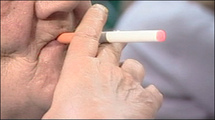
.In fact the WHO warned that the product, which claims to be a nicotine replacement therapy, could prove highly poisonous because it has not been subjected to rigorous scientific tests.
"It's 100 percent false to affirm this is a therapy for smokers to quit," WHO anti-tobacco official Douglas Bettcher told journalists.
"There are a number of chemical additives in the product which could be very toxic," he warned.
Electronic cigarettes are usually made of stainless steel and have a chamber for storing liquid nicotine in various concentrations. Users puff on them as they would a real cigarette but do not light them -- rather the cigarettes produce a fine, heated mist which is absorbed into the lungs.
The WHO is particularly aggrieved that some manufacturers have implied the organisation views it as a legitimate nicotine replacement therapy, like nicotine gum, lozenges and patches.
"Manufacturers of this electronic cigarette around the world have included WHO's name or logo, for example on their website, on package inserts or on advertisements," Bettcher said, without naming any company or manufacturer.
The WHO has sent "cease-and-desist" letters to the manufacturers demanding they immediately withdraw these claims or otherwise face legal action.
The organisation "is also going to be sending a note around the world to our member states to alert them of these bogus, untested, false claims," Bettcher said.
"They're trying to piggy-back on the name of WHO to legitimise this product as credible, and this is of great concern to this organisation."
The WHO "knows of absolutely no scientific evidence whatsoever that would confirm that the electronic cigarette is a safe and effective smoking cessation device," he added.
Bettcher said the organisation did not rule out entirely the possibility that the electronic cigarette could help people quit smoking, "but the fact is that the appropriate scientific tests to prove efficacy, safety, quality have not been done so there's absolutely no basis for making these claims."
"We don't know whether the cigarette may actually have the opposite effect, it may actually encourage non-smokers, particularly young people and children to start smoking," he added.
The electronic cigarette was first developed by a Chinese company based in Hong Kong in 2004, and is now sold in several other countries including Brazil, Britain, Canada, Finland and Israel.
Turkey is the only country to date to have suspended the sale of the product because of the lack of scientific testing, the WHO said.
Bettcher admitted that the WHO, governments and regulatory authorities had been taken by surprise by the rapid growth of the electronic cigarettes which are usually sold via the Internet.
He called on the manufacturers and marketers to conduct clinical studies and toxicity analyses and operate within the "proper regulatory framework".
"Until they do that, WHO cannot consider the electronic cigarette to be an appropriate nicotine replacement therapy, and it certainly cannot accept false suggestions that it has approved and endorsed the product."
"It's 100 percent false to affirm this is a therapy for smokers to quit," WHO anti-tobacco official Douglas Bettcher told journalists.
"There are a number of chemical additives in the product which could be very toxic," he warned.
Electronic cigarettes are usually made of stainless steel and have a chamber for storing liquid nicotine in various concentrations. Users puff on them as they would a real cigarette but do not light them -- rather the cigarettes produce a fine, heated mist which is absorbed into the lungs.
The WHO is particularly aggrieved that some manufacturers have implied the organisation views it as a legitimate nicotine replacement therapy, like nicotine gum, lozenges and patches.
"Manufacturers of this electronic cigarette around the world have included WHO's name or logo, for example on their website, on package inserts or on advertisements," Bettcher said, without naming any company or manufacturer.
The WHO has sent "cease-and-desist" letters to the manufacturers demanding they immediately withdraw these claims or otherwise face legal action.
The organisation "is also going to be sending a note around the world to our member states to alert them of these bogus, untested, false claims," Bettcher said.
"They're trying to piggy-back on the name of WHO to legitimise this product as credible, and this is of great concern to this organisation."
The WHO "knows of absolutely no scientific evidence whatsoever that would confirm that the electronic cigarette is a safe and effective smoking cessation device," he added.
Bettcher said the organisation did not rule out entirely the possibility that the electronic cigarette could help people quit smoking, "but the fact is that the appropriate scientific tests to prove efficacy, safety, quality have not been done so there's absolutely no basis for making these claims."
"We don't know whether the cigarette may actually have the opposite effect, it may actually encourage non-smokers, particularly young people and children to start smoking," he added.
The electronic cigarette was first developed by a Chinese company based in Hong Kong in 2004, and is now sold in several other countries including Brazil, Britain, Canada, Finland and Israel.
Turkey is the only country to date to have suspended the sale of the product because of the lack of scientific testing, the WHO said.
Bettcher admitted that the WHO, governments and regulatory authorities had been taken by surprise by the rapid growth of the electronic cigarettes which are usually sold via the Internet.
He called on the manufacturers and marketers to conduct clinical studies and toxicity analyses and operate within the "proper regulatory framework".
"Until they do that, WHO cannot consider the electronic cigarette to be an appropriate nicotine replacement therapy, and it certainly cannot accept false suggestions that it has approved and endorsed the product."









 Home
Home Politics
Politics









